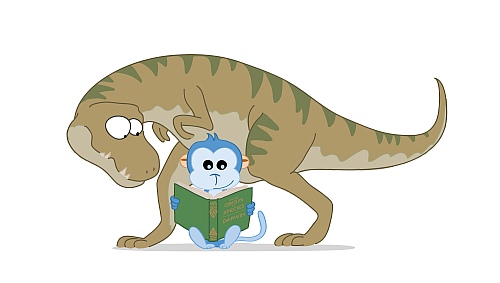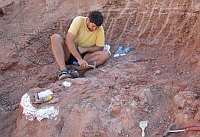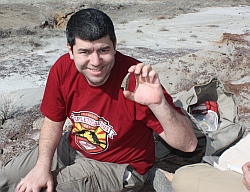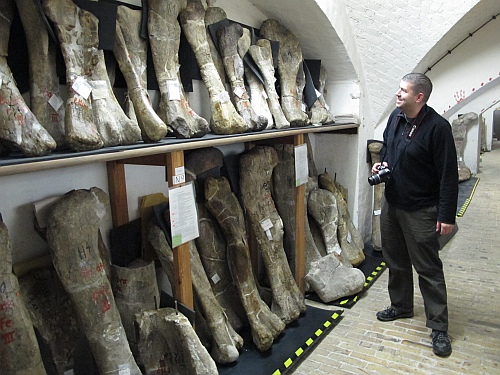On Nov 24, 1859, the biologist Charles Darwin’s book “On the Origin of Species” was published. Its full title was “On the Origin of Species by Means of Natural Selection, or the Preservation of Favoured Races in the Struggle for Life”. Darwin’s book introduced the scientific theory that populations evolve over the course of generations through a process of natural selection. The book was written for non-specialist readers and attracted widespread interest upon its publication. The whole edition was sold out on 1st day—even though at that time, only 1,170 copies were available for sale.
So we are very pleased that Dr. Dave Hone named our famous blue Monkey ‘Charlie’ as a tribute to Charles Darwin! Indeed, we stand for an evolution in scientific publishing, and the first PeerJ articles were published on Feb 12th, 2012—the birthday of Charles Darwin!

Dr. Hone is a paleontologist, lecturer at Queen Mary, University of London. We asked him how he came up with the name ‘Charlie’ for our blue monkey, and we invited him to write a guest post to share his passion for dinosaurs, and his involvement in science outreach.
“The name ‘Charlie’ was chosen in part to honour Charles Darwin and with the anniversary of his birth coming around, the timing was rather appropriate. The story of the name is quite simple and innocuous. I am a friend and colleague of a couple of the Academic Editors at PeerJ, and as I had kept up with the formation of the journal and its development, and as a strong supporter of Open Access, I was keen to see how it worked. As a result, I spotted the ‘Name that Monkey’ competition shortly after the launch of the journal and decided to enter.
There was quite literally no thought put into the name, it came to me instantly as being appropriately diminutive, fun, and with an obvious reference to Darwin, one of the greats. Most of all though, (and with apologies to all Charlies who might be reading this), to me he quite simply looked like a ‘Charlie’. I was however very surprised when I was told my name had been picked as the winner, and I am rather proud of being the one to name the little feller.
Darwin was perhaps something of an inevitable reference as I am a palaeontologist, and naturally evolution in all its forms crops up heavily in my research. In particular I have recently published a series of papers on detecting sexual selection in the fossil record, and the possibility of mutual sexual selection having been common in the non-avian dinosaurs. Debate has been raging for decades over the functions of the various crests, horns and frills seen across the dinosaurs and some of their relatives, but sexual selection has often been overlooked as a hypothesis because of the limited evidence for sexual dimorphism – major physical differences between males and females. While sexual dimorphism is commonly associated with sexual selection (think peacock trains, or the antlers of moose), it is not a requirement, and mutual sexual selection, where both males and females have ornaments, is common in birds and evidence for this in various groups is increasingly common.

Although I have dabbled in various lines of research, the main theme of my work is the ecology and behaviour of the predatory dinosaurs and the flying pterosaurs. In particular, I have looked at feeding behaviours in carnivores and the patterns of predation and prey choice. Data from bite marks on bones and the stomach contents of animals, as well as coprolites, can provide evidence for which animals were feeding on which others and how. I’m currently working on a skull and partial skeleton of the large carnivorous dinosaur Daspletosaurus from Alberta, Canada that shows some possible evidence for cannibalism, with post mortem bite marks from teeth that may have come from another animal of the same genus. This work is supported by a crowd-sourced fund with dozens of the public contributing to the total that allowed me to do the work.

In part, I suspect this appeal was successful because of the outreach work I do. Somewhat linked to Open Access principle (since it is ultimately about sharing knowledge and education) I am very active in science outreach. In addition to various public talks, and TV and radio spots, I do most of my outreach work online. It makes things flexible and manageable and able to reach audiences round the world. I have been blogging for over five years at the Archosaur Musings, have been at the Guardian for a year with the Lost Worlds and helped found and set-up Pterosaur.net. However, I think my most important contribution has been to set up Ask A Biologist where the public can leave their biology-based questions on the site and they are tackled by a series of researchers from around the world. Over the last 6 years we have answered thousands of questions and been seen by millions, so it is a wonderfully effective way of reaching people and breaking down the barriers between scientists and the public.

This then is a snapshot of my research and outreach interests and activities. I have not yet published in PeerJ, but having already named Charlie and seen many colleagues contribute dinosaurian-based manuscripts to the burgeoning collection it is only a matter of time before I will submit something for consideration here.”
Dont forget that from now until end-2013, we are running a special offer for free PeerJ Publication.

